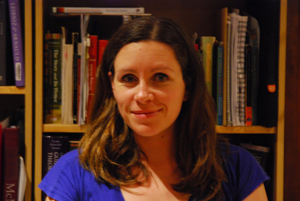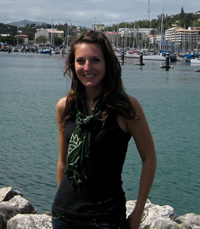Writing as a Continuum of Fear: Alexandra Handley in Conversation with Liz Windhorst Harmer

Malahat volunteer Alexandra Handley talks with Liz Windhorst Harmer, the winner of our 2013 Constance Rooke Creative Nonfiction Prize.
Congratulations on winning the Malahat’s 2013 Constance Rooke Creative Nonfiction Prize. It was a joy to read your work and it is a pleasure to talk with you.
Thank you so much. It was such a wonderful surprise to find I'd won, and I'm glad for the chance to talk about the piece.
Contest judge John Vaillant said that your winning entry, “Blip,” “demonstrates a wonderful discipline and restraint.” I have to agree, and I wonder if it was difficult for you to construct such a contained narrative from your past experience?
In one way it was very difficult. About two years ago I abandoned the writing of a long memoir based on this experience. I had already written 100 pages and was learning all sorts of things about the experience, but I realized that the timing wasn't right for me to write this as a book. I happened at that point to be reading some essays by Jonathan Franzen. One of the essays, called "The Discomfort Zone," weaves biographical information about Charles Schultz into a narrative about Franzen's home life, and it inspired me to distill the long memoir I was working on into a shorter piece. So, “Blip” was distilled from quite a lot of work and time and energy and thinking.
Then, I wrote the first draft for "Blip" all in one sitting. It was one of those rare and thrilling moments. I had a crystallized memory of myself sitting at that hospital cafe, staring out into the night and feeling that a kind of joy and wisdom had seeped out of me, and once I started from that scene the rest just followed. But there was yet more revision after that. There was a lot of killing my darlings in order to get this down, and I edited out a few more darlings to get the word count down in order to enter the contest, and I'm thankful I did.
What is the process of remembering and recounting like for you?
I find the way those two processes interact to be illuminating and quite fascinating. Sometimes when I’m working to recount something, I realize that it can’t have happened the way I think. Writing it down exposes the plot holes. Recounting also externalizes, like a photograph. When I was working on the memoir, I contacted various people who had known me at that time, and their perspective was alarmingly different from my own. An old friend sent me photos of myself I’d never seen, and I realized that in scenes where I felt very strong and in control I looked tiny and young and fragile.
Your personal essay, “Pain: a Brief History of my Intensity,” won first runner-up in The New Quarterly’s 2013 Edna Staebler Personal Essay Contest. “Blip” recounts aspects of the same experience in your life. How has it felt to address this particular part of your past from different angles and in different modes?
Partly it’s just a trick I learned from my husband, who’s an academic. I was always trying to stuff everything in to one piece, and he advised me to use a series of pieces to get at different ideas.
The experience had many causes and many consequences, filled the better part of a year, and still haunts me all the time. Aspects of it came into that essay in TNQ by accident; that essay was supposed to be about why I like childbirth so much and this funny CrossFit slogan. Madness snuck itself in. In that essay I sort of dig out one of the causes of my eating disorder back then, a personality trait that is of course still with me. “Blip” is much more wistful and the angle I’m taking is that this monumental experience is turning out only to be a blip in the span of my life and also it makes me a medical anomaly. I wanted to wonder at it.
What did it mean to you to ground "Blip" in Hamilton, Ontario by including the names of city streets? Do these details point to something about your experience that was directly affected by your geography?
Yes! Living in the psych ward at seventeen was my first taste of being away from my parents’ home for an extended period, and I fell in love with the geography of Hamilton while I was at St. Joseph’s. It was my home. The statue of St. Joseph in the lobby, the streetlights I watched from my fourth floor bedroom, the feeling of anonymous urbanity I’d never experienced before, and the face of our lush escarpment, where the hospital is sort of nestled: all of these were very important to me. I still sometimes long for the place as though it’s a home for which I’m nostalgic. In my psychosis, I gave a lot of importance to the street names, too. I fell in love with a man named James with the same diagnosis, and he would stand at the corner of James St. and Duke St. wearing a Duke jersey and that seemed very beautiful to us. I remember another friend of mine gently pointing out to me that the Queen Elizabeth Way (which would have stood in for me) didn’t intersect with James St, as a way of explaining that we weren’t destined to be together. I also had a complicated interpretation of the hallways in the hospital and how they corresponded to the streets outside. I guess that the cityscape was just another victim of manic meaning-making and beauty-seeing, and it still bears that imprint for me.
On your blog, you describe yourself as a “writer of prose short and long, fiction and non-. rarely a poet.” What attracts you to prose? What functions do the short story and the personal essay form serve for you that poetry, perhaps, does not?
This is a question I’ve thought a lot about, and one that I have no good answers for. I read a lot of poetry, love poetry, and know some really excellent poets whom I respect and admire. I love those bursts of insight that are fitting in both essays and poems. But for some reason the thing pouring out of me is prose. In The Art of the Poetic Line, James Longenbach writes that the essential difference between poetry and prose is that poetry is built by lines. All of that is a long way around your question. The reason I write prose, I think, is because I am more interested in expansion than contraction, and also because I enjoy the work of structuring prose. I enjoy plotting and characterization, and how the variety of elements must fit together.
Do you ever find writing personal non-fiction to be frightening?
I am not frightened by the writing, but the publishing does frighten me sometimes. With non-fiction, I get much more nervous that the very hesitant thesis I’m making is dead wrong or will be misconstrued. Having my non-fiction read is an exercise in vulnerability, and the reverse is true for me in fiction. I often find myself upset by something I’ve written in a story—upset in a vague way—but publishing fiction feels less frightening because it feels less personal, hiding as it does in its fictional world. I teach a piece called “A Poem that Scares You” (from a book of exercises called The Practice of Poetry) about going deeply in to some frightening place in your writing, and I’ve definitely felt that before, at least in writing my fiction.
Though perhaps all the writing I do is experienced on a continuum of fear. None of it feels entirely safe.
What advice do you have for authors who wish to write non-fiction prose but are daunted by the project?
I guess one of the difficulties of non-fiction is structuring, knowing what’s necessary, knowing what needs to be cut. Don’t feel like you have to put all of your feelings about a certain event into one piece. As Richard Bausch has said to me about writing fiction, “You are the docent of your museum.” So that although you’re relating true events, you have the right to decide how you convey them and what, exactly, you want to tell. You need to do it to learn how to do it. Do not be afraid to cut.
Another difficulty with writing personal non-fiction is learning how to have enough distance from yourself. If you worry too much about how you’ll appear in the final product, you’ll never be able to get it down. Be daunted but do it anyway.
Anne Lamott has an essay called “Shitty First Drafts” that changed my life: let the first draft be shitty. Sometimes all you get out of a first draft is one good line.

Alexandra Handley
* * * * * * * *
Read contest details about the Constance Rooke Creative Nonfiction Prize.









